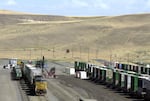
In this Aug. 3, 2004, file photo, garbage, hauled in by train, is unloaded onto trucks for transfer to the Arlington, Ore., landfill.
Don Ryan / AP
The Oregon Department of Environmental Quality has fined two companies for illegally dumping 2.5 million pounds of radioactive waste in an Oregon landfill.
Chemical Waste Management (CWM) and Oilfield Waste Logistics (OWL) have been fined a total of $368,656 in penalties for illegally dumping 2.5 million pounds of radioactive waste at CWM Arlington landfill over a period of three years.
OWL’s civil penalty of $308,656 represents the estimated economic benefit the company gained by avoiding the additional costs of legally disposing of the radioactive waste at the facility. The $60,000 civil penalty assessed against CWM, a subsidiary of Waste Management Inc., is for the illegal disposal of radioactive waste and for failing to comply with the hazardous waste disposal permit that requires radiation screening.
DEQ’s investigation found both companies had between 64 and 80 shipments of radioactive waste between 2016 and 2019. It issued the fines on Friday.
The Arlington facility is the only hazardous waste landfill in Oregon and, according to the Oregon Department of Energy, Oregon law prohibits the disposal of radioactive materials in the state.
In February, ODOE issued a violation to CWM after receiving a tip from a North Dakota man last September, who was under the impression that fracking waste from his state was being illegally dumped in an Oregon landfill.
Related: 2.5M pounds of radioactive waste illegally dumped in Oregon landfill
ODOE found CWM illegally dumped nearly 1,284 tons of radioactive waste in the landfill between 2016 and 2019, totaling over 2.5 million pounds. Some of that waste exceeded Oregon’s threshold for acceptable levels of radioactivity, which is measured by picocuries, the amount of radioactivity in a liter of air. Oregon’s standards are 5 picocuries per gram for radium 226 and 20 picocuries per gram of radium 228. The waste that was received at the facility had concentrations up to 1,700 picocuries per gram.
CWM spokesperson Jackie Lang said the company is committed to full compliance and has been working closely with both agencies.
“We immediately stopped taking the material when the state alerted us to a potential problem. We initiated our own investigation and then strengthened our controls so it wouldn’t happen again,” Lang said. “It’s also important to understand that all information indicated very low risk associated with the material. The Oregon Department of Energy (ODOE) stated in its initial assessment that there’s ’no current threat to landfill workers, the public or the environment.’”
Lang said an independent radiation and risk analysis expert has validated ODOE’s early assessment that the material indicated very low risk.
Meanwhile, Jason LaQua, Oilfield Waste Logistics president and founder, said the company will be requesting a hearing to appeal the fines.
In an emailed statement, LaQua said the correspondence between OWL and Waste Management clearly indicates and documents that Waste Management determined the Oil Energy and Production waste that OWL was hauling could be disposed of under Oregon law.
“My understanding was that WM was fully aware of the entire waste management process and procedures given that WM was an Oil Energy and Production waste generation, hauler, and disposer” LaQua said.
LaQua said OWL initially sent four containers of waste by rail and then 64 loads by truck to WM from May 2016 to September 2019.
OWL never had a load rejected at the Arlington waste facility.
Critics said the state did not do enough to ensure this would not happen again and should have issued higher penalties.
Columbia Riverkeeper legal and program director Lauren Goldberg said when nearby residents found out about the illegal disposal of radioactive waste, they were angry, disappointed and fearful about having the waste in the areas where they live.
“DEQ should have gone further in sending that message. While the fine is an important milestone it’s not enough to act as a strong deterrent we need in Oregon to ensure that fracking waste doesn’t find a permanent home in our state,” Goldberg said.
Goldberg said Oregon regulators need to do more to protect the environment from various sources of pollution, including fracking waste.
“The fact that it took Oregon regulators so long to recognize a serious problem is incredibly troubling,” she said. “Both for people that live near this facility and as well as for tribal nations who have expressed serious concern about the radioactive fracking waste that was dumped in the Arlington area.”
